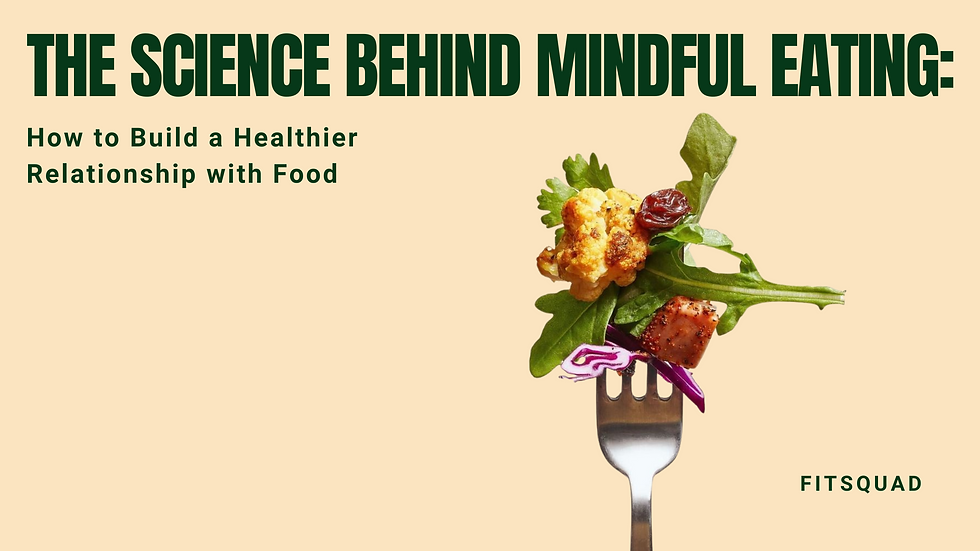The Science Behind Mindful Eating: How to Build a Healthier Relationship with Food
- fitsquadind
- Jul 10, 2025
- 4 min read

Mindful eating is gaining traction as a practical, evidence-based approach to improving our relationship with food. It is revolutionizing how we think about food and nutrition. This evidence-based approach focuses on the how of eating rather than just the what, offering a refreshing alternative to restrictive diets and food rules. Let's dive into the fascinating science behind this practice and discover why it's becoming a game-changer for health and wellness.
What Is Mindful Eating?
Mindful eating means paying full attention to your food, your body's hunger and fullness cues, and the overall eating experience. It's about eating with intention and awareness, not judgment. This practice encourages you to notice flavors, textures, aromas, and how different foods make you feel both physically and emotionally.
Unlike traditional dieting approaches that focus on external rules, mindful eating tunes you into your body's internal wisdom. It's about presence, not perfection.
Why Mindful Eating Matters?
The statistics are eye-opening: the average person makes nearly 100 food-related decisions every day, most of which are made without realizing it. From choosing breakfast to deciding on evening snacks, we're constantly making food choices on autopilot.
This unconscious eating pattern creates a disconnect between what our bodies need and what we consume. Mindful eating bridges this gap by helping reduce overeating, improving digestion, and making meals more satisfying. Research demonstrates that mindful eating supports sustainable weight management and encourages healthier eating habits through awareness rather than restriction.
The Science: How Mindful Eating Works?
Benefits for the Body
When you eat slowly and mindfully, you activate your parasympathetic nervous system—the "rest and digest" mode. This physiological shift improves digestion and enhances nutrient absorption, allowing your body to extract more value from the same meal.
Mindful eating also helps regulate crucial appetite hormones. Ghrelin signals hunger, while leptin signals fullness. When you eat slowly and pay attention, these hormones can function properly, making it easier to recognize true hunger versus comfortable satisfaction.
Benefits for the Brain
The neurological benefits are equally impressive. Practicing mindfulness at meals reduces stress and improves mood. Studies show that mindful eaters report greater food enjoyment and less guilt or anxiety around eating. This positive relationship with food creates a healthier mental framework around nutrition.
Why Our Relationship with Food Gets Complicated?
Our eating habits are shaped by a complex mix of cultural norms, family traditions, emotions, and constant exposure to food marketing and social media. Diet culture often adds guilt and confusion, making it difficult to trust our own hunger and fullness signals.
Signs of a Healthy Relationship with Food
A healthy relationship with food includes eating without guilt or overly strict rules, listening to your body's hunger and fullness cues, and enjoying all foods in moderation. Most importantly, it means not letting food control your emotions or daily decisions.
People with healthy food relationships don't panic over eating cake or skipping salad. They understand that one meal doesn't define their health and approach eating with curiosity rather than judgment.
Mindful Eating in Action: Simple Habits
Engage your senses: Notice the colors, smells, textures, and flavors of your food. This sensory awareness enhances satisfaction and enjoyment.
Eliminate distractions: Put away electronic devices and focus on your meal. This simple change increases awareness and naturally reduces overeating.
Practice the pause: Mid-meal, check in with your hunger level. This prevents overeating and helps you reconnect with your body's signals.
Drop food labels: Stop categorizing foods as "good" or "bad." Instead, consider how different foods make you feel and what your body needs.
Embrace self-compassion: Focus on progress, not perfection. Some meals will be more mindful than others, and that's completely normal.
Your Mindful Eating Toolkit
Habit | How to Practice | Why It Works |
Eat without distractions | Sit at the table, turn off screens | Increases awareness, reduces overeating |
Chew slowly | Put down utensils between bites | Enhances digestion and enjoyment |
Check in with hunger | Rate hunger before and after meals | Reconnects you with your body’s cues |
Practice gratitude | Take a moment to appreciate your food | Boosts satisfaction and mindfulness |
Overcoming Common Challenges
Busy schedules: Prepare simple meals and eat slowly when possible. Even a few mindful bites make a difference.
Emotional eating: Notice your feelings before reaching for food. Mindful eating can help you distinguish between physical hunger and emotional cravings.
Family or social pressures: Share mindful eating tips with loved ones and focus on your own experience, not others’ opinions.
Diet culture: Remember, mindful eating is about awareness and enjoyment, not restriction or perfection.
The Research Behind Mindful Eating
Studies consistently show that mindful eating practices lead to improved eating behaviors, better weight management, and reduced binge eating episodes. Research published in Nutrition Journals demonstrates that people who practice mindful eating show:
Improved satiety recognition
Reduced emotional eating
Better digestion and nutrient absorption
Decreased eating-related anxiety
More sustainable, healthy eating patterns
The psychological benefits include reduced stress around food choices and improved overall relationship with eating.
Getting Started: Your Next Steps
The beauty of mindful eating lies in its simplicity and accessibility. It doesn't require special equipment, expensive supplements, or complicated meal plans. It just requires your attention and willingness to tune into your body's wisdom.
Your journey to a healthier relationship with food starts with your very next bite. Take a deep breath, engage your senses, and discover how mindful eating can transform not just how you eat, but how you feel about food itself.
_edited.png)


